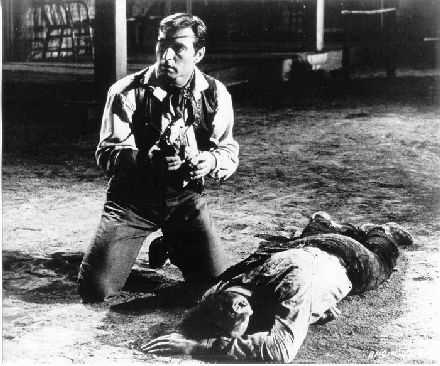Black Patch (1957) 
“The Marshal who loved the wife of a killer – a killer they found with a hole in his back!”

Director: Allen H. Miner
Cast: George Montgomery, Diane Brewster, Tom Pittman
Synopsis: A one-eyed marshal puts a bank-robber friend in jail, but two greedy locals try to get him out.
There’s an element of Noir about Allen H. Miner’s modest Western Black Patch that had me wondering why there isn’t more Western Noir movies. Given the Western conventions of treachery, gunfights, saloon girls and violence, you’d think the two genres would be natural bed-mates, but — with the exception of John Ford’s My Darling Clementine — I’m hard pushed to think of any other Westerns that come close to adopting aspects of Noir in the way that Black Patch does. That’s not to say that Miner’s movie steeps itself in Noir, but it’s clear in the way that certain shots are composed that the genre had some measure of influence on his directing style here.
Black Patch was produced by Montgomery Productions, and George Montgomery (Roxie Hart) takes the title role of Civil War veteran Clay Morgan, who’s the sheriff of a New Mexico town. Morgan lost an eye during the war, and conceals the wound behind an eye patch, but being half-blind doesn’t prevent him from being a wizard with a gun which, together with the conscientious way he keeps the town’s citizens on the straight and narrow, earns him the admiration of young Flytrap (Tom Pittman — Apache Territory) who works as Morgan’s unofficial assistant. Morgan’s well-ordered life is disrupted, however, by the arrival in town of Hank Danner (Leo Gordon — Apache Territory), an old friend. In fact, it’s not so much the appearance of Danner that ruffles Morgan’s feathers as that of Danner’s wife, Helen (Diane Brewster), who was Morgan’s girl before the war, especially when it becomes clear that the flame still burns bright in both of them.
It turns out that Danner has turned to a life of crime, and is on the run after robbing a bank of $40,000, a piece of news that soon reaches the ears of shady saloon owner, Frenchy DeVere (Sebastian Cabot). Once Morgan has arrested Danner, DeVere gets word to the prisoner that he will arrange his escape in return for learning the location of the loot from the robbery. Danner reluctantly agrees to share half the proceeds of the robbery with the saloon owner, but after recovering the loot and enabling Danner to escape, DeVere has his henchman shoot him in the back with the intention of retrieving the rest of the money. However, his goon shoots Danner too soon, and Morgan is on the scene before he can grab the loot. The townsfolk and Helen arrive shortly afterwards to find Morgan kneeling over Danner’s body and automatically assume that it was he who shot the escaping man in the back.
There’s an unusual feel about Black Patch, as if Miner and Leo Gordon (who wrote the screenplay as well as playing the part of Hank Danner) made a conscious effort to produce something noticeably different from the hundreds of B-Westerns that Hollywood was churning out in the 1950s. They weren’t entirely successful – the plot is too loose at times, lacking focus when it should be ladling on the tension — but there are elements of Black Patch that are worth commending. The pervasive atmosphere of doom, for one, gives the impression that the fates of the characters are pre-ordained and that their struggles against them are futile. Saloon owner Devere pulls the strings like some insouciant rogue who wants to be louche but is too low-rent to pull it off. He spends most of his time playing chamber music on one of those tinny-sounding pianos – a unique effeminate affectation which is a pretension of the character rather than the filmmakers — but each time he pauses between delicate tunes it seems to be to manage an act of violence, whether personally against Kitty (Gordon’s wife Lynn Cartwright — The Apartment) the saloon girl who seems to be perpetually lounging on a chaise longue, or his henchman (House Peters Jr — Kansas City Confidential), whom he ‘shoots’ with a gun in which he has placed bullets dipped in champagne so that they won’t fire, or inciting others to kill, such as the disillusioned Flytrap who unexpectedly demonstrates a God-given knack for the quick draw.
Black Patch’s finale is as off-key as the rest of the movie, with the bad guys remaining free (although presumably to be shortly incarcerated or killed) and Flytrap experiencing a change of heart which is too quick to be convincing. It’s an odd way to leave an otherwise reasonably engrossing story, but one that’s in keeping with Black Patch’s overall quirkiness. If they’d only tightened up the plot they might have had a small classic on their hands…
(Reviewed 10th April 2014)
